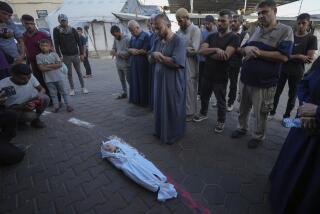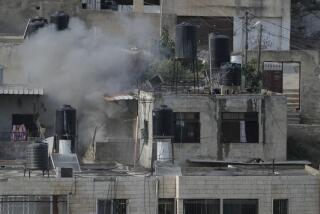Arafat Appeals for Help as Israel Presses Crackdown
RAMALLAH, West Bank — A besieged Yasser Arafat appealed to the world for help Saturday against Israeli forces that have destroyed and occupied most of the compound where the Palestinian Authority president lives and works.
Huddled in hallways and confined to two floors of his headquarters, Arafat and about 100 of his die-hard supporters erected a barricade and stacked desks against windows in anticipation of a final Israeli assault, according to people who visited.
Israel ignored international pleas to reverse its invasion of this West Bank city and instead expanded its punishing military offensive and tightened its siege of Arafat. Israeli forces rounded up hundreds of Palestinian men--including emergency medics and police--in what the government of Prime Minister Ariel Sharon has described as a hunt for terrorists.
Sharon declared Arafat an enemy last week, dispatched scores of tanks into the West Bank and Gaza Strip, and mobilized 20,000 reservists for a “long and complicated war” against the Palestinian chief and the suicide bombers and other extremists who have attacked Israelis.
The offensive followed a suicide bombing Wednesday that killed 23 people--the deadliest such attack in 18 months of violence. Two more suicide attacks have occurred since, including one in Tel Aviv on Saturday that injured 32 people but killed only the bomber.
Tanks that already hold sway in Ramallah moved into position Saturday around the sprawling U.S.-built headquarters of Arafat’s West Bank security chief, Col. Jibril Rajoub, and demanded the surrender of key militants thought to be hiding there. Tanks also roared into the town of Beit Jala, next to the biblical city of Bethlehem, where Christians are observing Easter weekend.
One of Arafat’s bodyguards and an intelligence officer were killed in sporadic gun battles around the Palestinian leader’s compound.
And the bodies of five Palestinian policemen were found in a building seized and then abandoned by Israeli forces. Palestinians said the men were executed in cold blood; the army said their deaths resulted from a firefight.
Arafat, said to be following the news on a small radio, may have taken comfort from the United Nations Security Council’s call for Israel to leave Ramallah. The resolution passed 14 to 0 around dawn Saturday, after marathon discussions and, unusually, with U.S. support.
Inside Arafat’s compound, guards and supporters were eating boiled potatoes and pita bread, using candles and cigarette lighters as illumination, and sleeping on floors. Adam Shapiro, a New York-born pro-Palestinian peace activist, spent Friday night and much of Saturday there. He said supplies of water and food were dwindling, electricity was cut and the power generators were running low. Telephone lines also were cut.
Shapiro said Arafat’s guards had turned a luggage scanner, usually used for security checks of visitors, sideways across the entrance facing Israeli forces just 15 yards from the front door. Men with rifles guarded that position.
The International Committee of the Red Cross was enlisted Saturday to ferry bread, milk and cheese to Arafat and his associates.
“I am appealing to the whole international world to stop this aggression against our people, this military escalation day [and] night, this killing,” the Palestinian leader told a camera crew from Reuters television that Israel allowed to enter the compound. The interview was conducted by candlelight.
Men, Boys Ordered to Detention Centers
Meanwhile, Israeli soldiers using megaphones swept through Ramallah ordering all men ages 16 to 45 to report to detention centers. In the Al Bireh neighborhood, young men approached the tanks and armored troop carriers surrounding the Mogtaribeen School. A soldier ordered each to lift his coat, then his shirt, to expose bare bellies and the absence of explosives.
Inside the walls of the school, several hundred Palestinian men and boys sat cross-legged in the concrete courtyard under heavy guard. A few said their noon prayers, using their jackets as prayer mats. Snipers occupied the second floor of the school, looking down on the men.
The army lieutenant colonel in charge said the men and boys would be required to present their identification numbers, which would be checked for terrorist connections. Most would wait for hours and, in the end, only about 1% would be formally arrested, the officer said.
“Most of the people here are innocent,” he said.
Elsewhere, ground forces backed by tanks, other armor and German shepherds raided houses, businesses and the private Arab Care Hospital.
“We asked them what they wanted,” said Dr. Shawki Harb, a surgeon at the 30-bed hospital. “All they said was ‘Sheket!’ “--”Quiet!” in Hebrew.
Doctors and nurses were ordered to remain where they were and not move about during the search, which lasted about an hour. No one was taken away or questioned, and the doctors were puzzled about what the soldiers were looking for.
“One of the soldiers told me: ‘I’m from [the Israeli advocacy group] Peace Now. I’m against this,’ ” Harb said.
Among the patients at the hospital was Riphi Kobaari, a freelance Palestinian cameraman who said he was beaten by soldiers who had seized and destroyed his tapes after he took photos near Arafat’s compound.
Another was 14-year-old Suleiman Zaloum, who was shot in the abdomen, legs and lower chest in the early hours of the Israeli invasion. Doctors said the boy lost so much blood that he didn’t have a pulse when he reached the hospital.
Inside Arafat’s compound, eight members of two ambulance crews, plus two of their wounded patients, were arrested by soldiers and held for hours, the Palestinian Red Crescent Society said. Three other medics also were arrested, their associates said.
The army said it had arrested 145 people from throughout Ramallah in the last two days.
5 Policemen Found Slain in a Building
The bodies of the five Palestinian policemen were found on the third floor of a building near downtown Ramallah. Israeli troops had occupied the building and then abandoned it early Saturday.
The men, in their 40s or 50s, appeared to have been shot in the head or neck at close range. The room where they were found--an office called the Center for Dissemination of Democracy and Community Development--was splattered with blood and pocked with bullet or shrapnel holes. A string of bloodstains was sprayed across the wall at what would have been about head level if the men had been sitting when shot. The Israeli army said in a statement that the officers had been killed in a close-quarter firefight.
Maher Shaladi, bureau chief for Dubai Television, has offices on the top floor of the building. He said that a large number of Palestinian police armed with Kalashnikovs had entered the building ahead of the Israeli forces and that intense gunfire could be heard. But the position of the five bodies and the nature of the wounds raised questions about whether the men had died in a gun battle.
The army also displayed dozens of automatic rifles, handguns and more than 30 rocket-propelled grenades Saturday that it said had been seized from Arafat’s compound.
More to Read
Sign up for Essential California
The most important California stories and recommendations in your inbox every morning.
You may occasionally receive promotional content from the Los Angeles Times.











